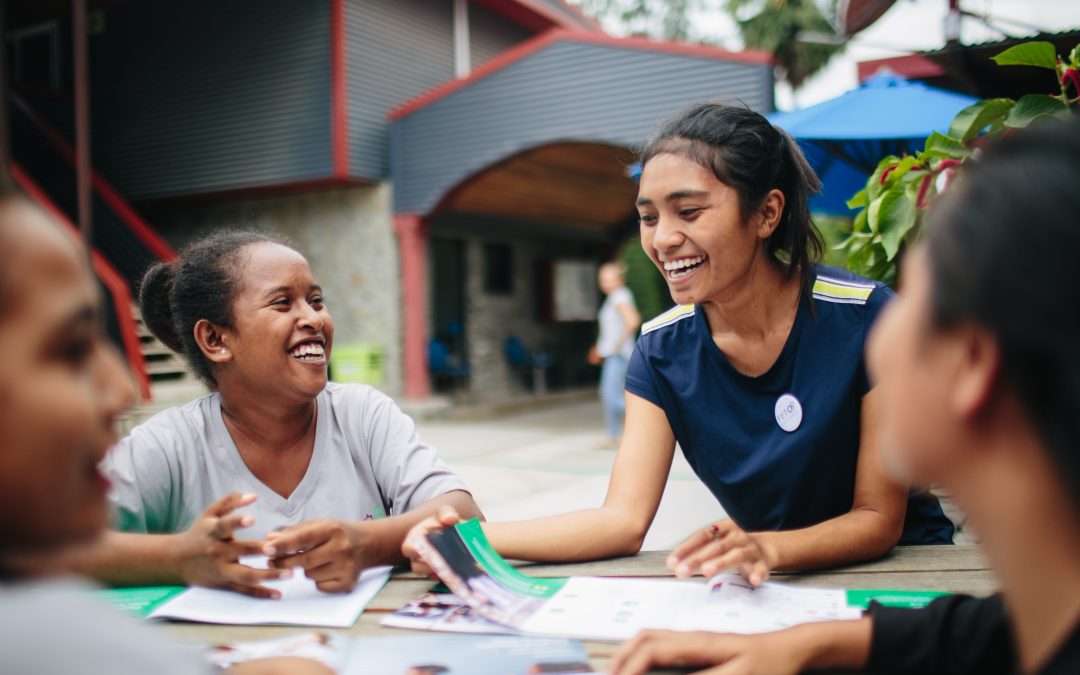In Timor-Leste essential services and infrastructure are still developing and a relatively low-skilled engineering sector compounds these challenges. Women in particular face specific barriers accessing education and employment. So EWB Australia’s program Feto Enjiñeira or Women in Engineering initiative is working with female graduates and students of engineering to build their professional capacity and engagement through skills development, mentoring, and peer to peer support. This ‘sisterhood’ of engineers is acting as an important catalyst for diversity in a male dominated sector.
In FY 2017/2018, 31 young women joined Feto Enjiñeira, and together the group engaged in outreach activities with 476 high school students, including 260 females. Feto Enjiñeira also collaborates with the EWB Australia Professional Skills Development program on skills workshops and student design challenges, building the skills of 500 engineering and technical professionals in FY 2016/2017, of whom 167 were women.
“In this country even in organisations that recruit women with a technical background they are sometimes recruited to work as an admin instead of as an engineer,” explains Dulce Soares, who leads Feto Enjiñeira “This means there is a lack of belief in them as a technical person. By having Feto Enjiñeira step up, and talk about the importance of being involved in leadership, that can influence others. We talk about challenges for women engineers, we share ideas, and increase our capacity as women in engineering, so that we are not left behind.”
Marilia De Araujo Martins agrees. Having studied petroleum engineering she is motivated “to see more women working in technical roles in the oil and gas industry in Timor-Leste”, and believes “engineering is crucial to the development of the nation.” But like the others in the group she was discouraged from studying engineering, and told “if you study that, all you will be is a builder.” With only a small number with a friend or family member in the engineering sector, the mentoring and peer to peer support they get through Feto Enjiñeira is highly valued.
In time, Dulce says, the positive shift in skills and confidence these women gain is truly transformative. “When they start with Feto Enjiñeira they believe they have to be silent. But we do field activities, they get the chance to talk, lead, organise and conduct something. They feel they have an important role. That belief motivates them and gradually they change. They are able to speak, give their opinions, and have a critical mind.”
Sylviana Ferreira Carvalho a civil engineer working with CHL believes her experience with Feto Enjiñeira, and as an intern with EWB Australia’s Professional Skills Development program ‘helped a lot’ because “it is important is to set up those networks and learn something that relates to your studies.” Her professional skills facilitated her to secure her current role, and she has confidence working in a male dominated construction environment, saying “If you are professional then they will respect you.” Dulce witnessed this transformation first hand “The person that I knew joining the group was very quiet. But now I see Sylviana always raises her hand whenever there is a question, she always comes up with something else. Before it was only a ‘yes’, but now its ‘Yes and I also have these ideas!’
The transformation doesn’t stop there. As Dulce looks across the sector as a whole, she is encouraged to see engineering companies adapting to this new culture of women in engineering. “What we hear is there are now a lot of women in leadership in the engineering sector, and people have started recruiting women for technical jobs in the field. There are changes, and to make it stronger we have Feto Enjiñeira networking with organizations and with the government,” says Dulce “If people really understand the concept of women in engineering then it changes the idea that it is only about physical work. When we talk about creativity and about ideas, you don’t need to show your physical strength for that.”
Marillia agrees that old attitudes are being overturned. “I have learned a lot about leadership, and when we go out to work in communities we are role models to others. So what we have learned is important not just for us, but for all women working in engineering in Timor-Leste.”


